If you are considering an engine or 60k service from us please also consider leaving the balance shafts in your engine. We have created this page to allow YOU to make an educated decision involving your balance shafts.
We are not a company which caters to the 1% which want a car built to run in the single digits. We cater to the average person and many road racers. Those of us who want a car that we can drive every day and then take it to the track for some fun is what we are all about. Due to this we have become very successful and what we do seems to work quite well. We don't break any records because that's not what we do. We just build cars which will work and live a very long service life.
Due to the fact that our customers are just average people, we want them to have an engine which they will love. A smooth engine on the street is a very nice thing to have and many customers appreciate this. Most builders don't care about the comfort factor, or your clutch and trans, so they will build you the same loud and buzzy engine for the car that is daily driven as they do for their race cars. We don't believe this is appropriate.
You are free to make your own decisions. We are not forcing anyone to do anything and are more than happy to build anything you want, but please think twice before you decide to have us remove your balance shafts as you may not like what it will do to your car.
We used to be a company, just like all others, which encouraged customers to remove their balance shafts. We used to say that they were there for driver comfort and that removing them would help with reliability. We were wrong. It's hard to admit that you are wrong with something which has been widely accepted in the DSM and EVO 4G63 community, but we believe removing balance shafts is one of the worst things you can do to your car. So we are going to be the first to admit that we were wrong.
What balance shafts do is something terribly important. They drastically reduce engine crankshaft harmonics. Excessive harmonics can cause the following problems:
- Clutch drag at high RPM
- Clutch failure
- Buzzy engine
- Engine main bearing fretting and fatigue
- Crankshaft failure
- Buzzy interior and exterior parts
Excessive harmonics will cause clutch drag. If you perform the clutch drag test you will find that we want you to rev the engine high in order to see if the car moves forward. The higher the RPM, the more harmonics are created. What will happen is the clutch disk begins to buzz and wander in-between the flywheel and pressure plate because of the high frequency found in the engine harmonics. If the disk buzzes and flexes too violently, it will make contact and drag. We want our customers to adjust their clutch so that enough room is given to allow the disk to vibrate and not come into contact with the flywheel or pressure plate. If the disk doesn't touch, then the trans will shift nicely as there is no drag.
There are many cases where people adjust the clutch as much as they can, but it will still drag at high RPM. You can install a new clutch fork and assure it's in the correct position, replace the TOB, pivot ball, pressure plate, disk and a flywheel with the correct step and it will still drag at high RPM. Just do a search in any DSM or EVO forum. There are countless cases like this.
Those which have issues with clutch drag and can't get rid of it are usually people with high compression, added stroke, and/or removed balance shaft engines. This will create such excessive harmonics that the disk buzzes too violently and the clutch drag can't be eliminated at high RPM. They are then forced to switch to a 7.25" twin disk, which in our option is a horrid clutch for the street or drag racing. The reason a 7.25" twin does not drag is due to the size. It is smaller in diameter so the end of the disk will travel a shorter distance which will reduce its chances of dragging. The size is what prevents the disk from moving far enough to hit anything, which is why a small twin disk can shift at such high RPM.
Take your clutch disk and spline it to your trans input shaft. Then take your hand like in the picture below and wiggle it forward and back with your fingers. See how much it moves around? Harmonics will make the disk do this at high RPM and at a very high frequency. This vibration takes clearance away when you depress your clutch pedal causing your drag.
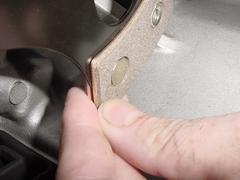
Balance shafts make an unbelievable difference with issues like this! A clutch which the customer has high RPM drag issues will never drag and shift better than anything the customer ever felt before when the balance shafts are reinstalled. We have proven this to ourselves over and over again. Balance shafts reduce harmonics and allow your single disk clutch to shift very nicely.
We know it's hard to believe. It may not make sense that the balance shafts driven by belts, and that are not directly connected to the crank, will be able to do this, but amazingly it somehow works!
We also used to think that it had to be something in-between the crank and clutch to prevent harmonics from reaching it, but that also turned out to be a very surprising misconception. They are somehow able to make the difference as far away as the clutch and it's a very big one!
Use a puck disk and notice after a short time that large chunks of the pucks have broken off? We used to think it was a heat issue, but what is in fact happening is the vibrations from the engine harmonics in some cars is so severe that the pads will crack and break off. The buzz we talked about above is very hard on the disk and will break the pucks. They crack and fling off in time. Some pictures below of this issue:
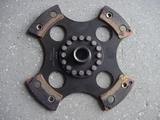
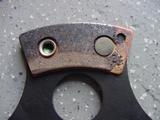
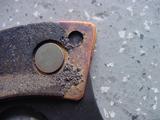
We see it all of the time. We have a customer come in with a car for the 60k timing belt service. The car is smooth, quiet and shifts perfectly at high RPM when they drop it off. During the timing belt job they want us to remove the balance shafts (which is an 'upgrade' many like to have performed). Once the balance shafts are removed parts vibrate, clutch drags, and engine feels so buzzy that the interior of the car now makes noise. In our opinion, the car is ruined. It was so nice when it was smooth and quiet and now it's a buzzy mess.
Common concerns associated with keeping your balance shafts are:
- Can the balance shaft belt break? Yes. This is known to happen, but only in poorly maintained vehicles and with belts soaked with oil or of a cheap make. Simply use a Kevlar belt, maintain the system properly and the belt will never break. The key is to make sure your balance belt is replaced at the same time as your cam belt. It is amazing how many people do not replace the balance belt when performing the 60k service and then it breaks. The person then blames the balance shaft.
- You want to zing your engine to the moon for some reason and believe the balance shafts will break somehow. In the many years we have been building 100s of 4G63 engines, we have never seen a balance shaft that had failed/broken. This is not to be mistaken with an engine that is ill kept, old and worn out. If your engine is worn out you risk spinning a balance shaft bearing and we have seen this in countless engines. Another thing we noticed too, though, is those same engines also had server wear on all of the other bearings as well. Your rod bearings are about the spin anyway so what's the difference? If you keep your oil level up and maintain the engine properly your balance shafts will be fine. If you are super worried about them, get the EVO balance shafts as they are slightly more aerodynamic. We have many customers which road race their 4G63s and especially one of our customers who is at any of our large tracks in Colorado at any given time racing his EVO the entire day (he's nuts). All have been doing this for years and none have ever had a balance shaft failure. Road racing a car and keeping it at redline and full power all day long is a true test of an engine and we have had 0 balance shaft failures. People which claim that you will have a balance shaft failure are not correct in our opinion. Our experience has been that they can work and live in the most extreme environments without issue.
- Will they rob power? Yes. They will take an un-noticed amount of power away, but it will be made up by the ability to shift your car at high RPM and have a clutch which is far more reliable. We believe this to be a worthy compromise for a street car.
- The engine will be balanced and blue-printed, so do you need balance shafts? YES! Engine balance has nothing to do with engine harmonics. The engine will create harmonics no matter how perfectly balanced it is. You still need them.
- Will added stroke and compression increase harmonics? YES! For those with these engines it is more important to keep your balance shafts. The more stroke and compression, the more harmonics.
TORSIONAL WHIP
While on the subject of things which could kill the pleasure of driving your car, we would also like to share info about crankshaft torsional whip.
What is torsional whip? Torsional whip is created in all piston engines. The whip is essentially the crank twisting back and forth due to the nature of how a piston engine works. Think about it. You have a piston which is creating resistance to the crank on the compression stroke. When the piston reaches TDC and your fuel/air ignites, it then quickly changes to adding force to the crank. So on each revolution the crank is forced to slow down on the first half of rotation, and then forced to speed back up on the second half of rotation. This causes the crank to twist back and forth for every revolution. No matter what the RPM, power, fuel, temp, compression it will always have these forces.
Imagine the forces the crank has to endure at high RPM. Lets say you are zinging your engine up to 8000RPM. At that speed your crank is twisting forward and back 133 times a second!! This whip is not gentle either, it's like a large hammer beating on your drive-train 133 times a second. When we think of what a crank is going through at high RPM, we think if just how fast it is rotating and how amazing it is that it can hold the power which we are forcing through it, but that's not all. It is also flexing and twisting while it is rotating and 133 times a second at your 8000RPM rev limit. It's something our minds just can't comprehend. This whip creates a series of problems for us.
Torsional whip is very destructive. Bolts will work their way loose in various places, you get a buzz from the engine, clutches drag and break, crankshafts break, the trans rattles and wears out, and the drive-shaft will resonate. What helps absorb torsional whip? Many things, and they are all parts which we comically try to remove when we modify our cars.
The parts which reduce torsional whip are:
- Heavy flywheels
- Springs in clutch disks
- Crank damper
- More rotational mass everywhere
The things which increase torsional whip:
- Lighter flywheels
- Unsprung clutches
- No crank dampening
- Adding stroke
- Raised compression
We have seen many people which complain about a noise they hear during cruise, coasting or deceleration in gear. We call it the 'womp womp' noise. It's a rattle you hear which resonates through the clutch, trans and drive-shaft, but most of it comes from the drive-shaft. This noise is caused by torsional whip. You can replace your trans, drive-shaft, t-case, rear end and it won't make a difference. The noise will always be there unless you find a way to reduce the whip from the engine. We found that using a heavy flywheel will also make a big difference in reducing this noise from your drive-train. Using a heavy flywheel and sprung disk will reduce this 'womp womp' noise by at least 75%.
Many think that the springs in a clutch disk are there for smooth engagement. This is not correct. The springs are there to absorb crankshaft torsional whip. If you use a solid unsprung disk, you are adding to the whip issue. This makes things difficult when choosing the right disk for your application as sprung disks are known to be unreliable. So do you deal with the added noises or use a sprung disk to help absorb it? That is your choice...
Torsional whip will resonate through your trans and cause accelerated spline wear in time. Remember the whip can be very violent and is at a high frequency, so everything in your drive-train is taking a beating. Are your t-case output shaft splines saw-toothed? Pictures below of spline wear from cars with excessive whip:

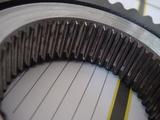
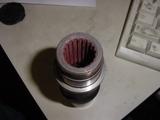
Excessive torsional whip is hard on gears too. Not only do the gears need to deal with your added torque and harshness of your clutch, but they take a beating from the torsional whip too. It's like the added torque isn't enough, we have to beat on them with a hammer over 100 times a second too. Without anything to absorb the abusive whip it goes right into the gears inside your trans. In time they will fatigue and break. No need for big power to break gears thanks to the whip. If you keep killing gears at a power level that shouldn't, then you could have an excessive torsional whip issue:
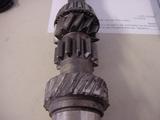
Excessive whip will also kill your trans synchros in time. If you have a Jacks Transmission we have found a solution so the synchros will live, but if you do not, you may experience synchro failure due to synchro mushrooming. Tech article about synchro mushrooming and spring failures HERE. Please note that if you have excessive harmonics and torsional whip, our transmissions are designed to handle that. It will not void your warranty.
So what we have learned is this- we know you want to modify your car so there may be no way around using an unsprung clutch, lighter flywheel, higher compression or added stroke. You have to use those parts to go fast, but one thing you can keep which will absorb a lot of those added harmonic creating mods is your balance shafts. The 4G63 balance shafts do an amazing job of absorbing these excessive harmonics. Just keep them in there.
As far as torsional forces are concerned, the balance shafts should do nothing to cure this, but we found that they do help a little. We understand that this may not make very much sense, but they definitely make a difference. Torsional stress is reduced a lot more by using a heavier flywheel and sprung clutch, but balance shafts also help in this area as well.
Why do you think the manufacturer installed the balance shafts in the first place? Why did they use such heavy flywheels and sprung clutches? To reduce the harmonics and torsional whip. Many luxury cars have dual mass flywheels to try to take more of these forces away. Many BMWs come with dual mass flywheels now. What do most BMW owners do the first time they touch their clutch? They remove their dual mass flywheel and install a standard light weight flywheel... Then they start to have 3rd gear synchro issues, they tear and break the rubber insulator flex joint and the car becomes unreliable. It's like us with the DSMs and EVOs. We just insist that we remove and throw away all of these carefully engineered and much needed parts thinking they are unreliable.
If you reinstall your balance shafts your trans will shift much better at high RPM and much of the drive-train noises you hear will be reduced. We will say again that your trans will shift a lot better with balance shafts in it! This change in shift quality is actually quite shocking! You want a trans that shifts nice? Stick those balance shafts back in that engine!
We used to think the balance shafts did nothing to absorb harmonics. We thought there had to be something in-line with the crank in order to reduce this stress, but as it turns out that's not the case. The balance shafts are attached to the crank via belts, but it works. We have proven to ourselves here over and over again that they work and better than anything else you add or remove from your car. Just keep them in there. Keep your car smooth, reliable and more pleasurable to drive.
If you have any questions regarding balance shafts please email us at sales@jackstransmissions.com

